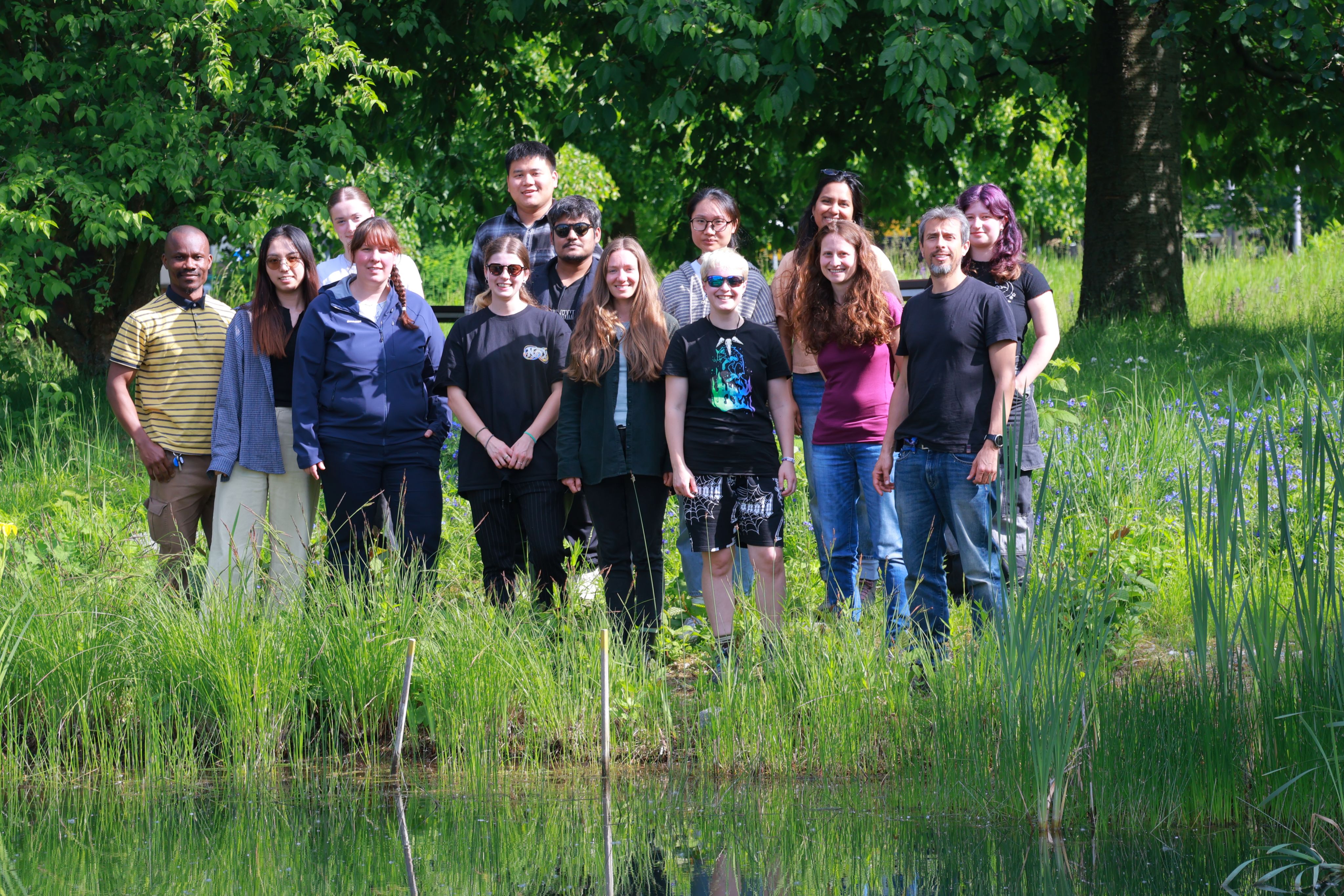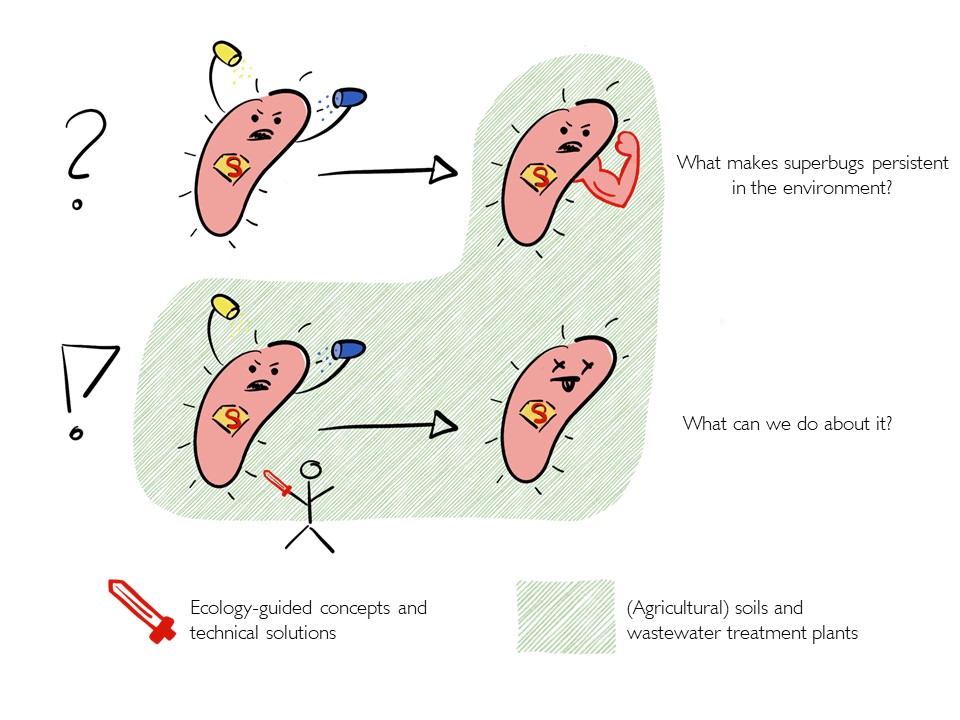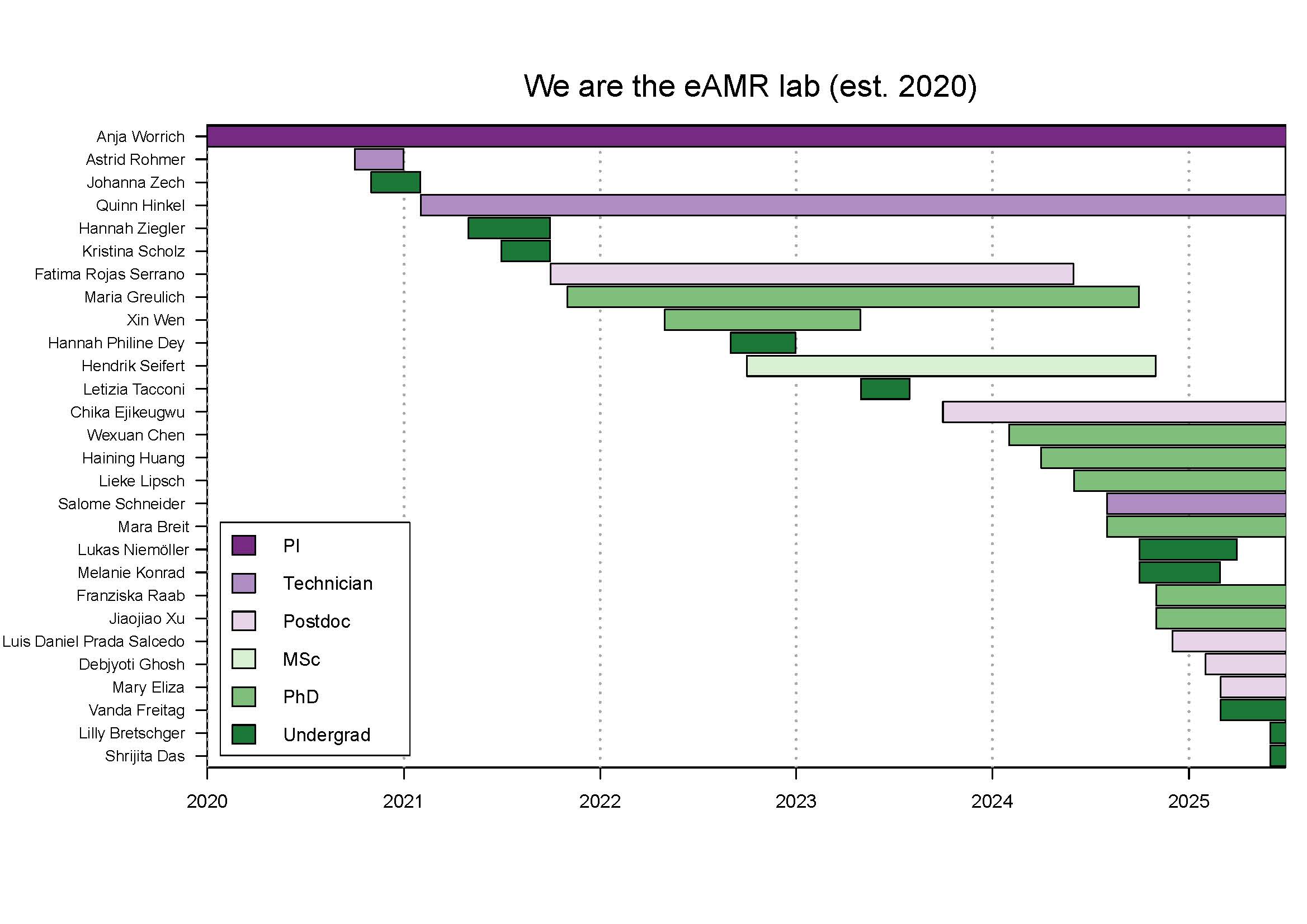Our research in a nutshell
Research topics The working group is studying the degradation and effects of antibiotics in the environment , especially in agricultural soils. The focus is on both the antibiotics themselves and the resistance genes in the bacteria. The specificity of the latter stems from their potential to replicate and spread in the environment and, when transferred to pathogens, to threaten human and animal health . Therefore, for the development of strategies to contain antimicrobial resistance, it is necessary to consider human, animal, and environmental health together (OneHealth approach). The environment in particular has been insufficiently addressed in previous measures. Investigate the fate and degradation of antibiotics in soil-plant systems and identify bacterial degraders. understand the effects of antibiotics on bacterial community activity in soil-plant systems. identify the drivers for the persistence and transfer of antibiotic resistance in bacterial communities in soils. assess the potential threat starting from antibiotic resistance in soils to human and animal health. find out the removal possibilities of antibiotics and antibiotic resistances from wastewater/slurry.
Current projects Please have a look at the websites of the team members for an overview about ongoing projects.
PhD Students Wenxuan Chen
Haining Huang
Lieke Lipsch
Mara Breit (jointly with Plant Biogeochemistry Group)
Jiaojiao Xu
Franziska Raab
Technicians Quinn Hinkel
Salome Schneider (apprentice)
Students Lukas Niemöller (Leipzig University)
Vanda Freitag (Leipzig University)
Our labs' history
Contact Dr. Anja Worrich
Working Group Environmental Antimicrobial Resistance
anja.worrich@ufz.de
Phone +49 341 235 482295
Permoserstraße 15 | 04318 Leipzig | Germany
News The group had a great two-day workshop with Christian Wirrwitz to reflect on the past and discuss how to manage Anja’s transition to BTU.
We are happy to welcome Anom Candra as a new intern in our group! She will assist Franzi with her greenhouse experiment, which focuses on the impact of antibiotics and their biotransformation in soil-plant systems.
Anja has accepted a tenure-track junior professorship at BTU Cottbus–Senftenberg, starting November 2025. The team members will continue their projects at UFZ.
We warmly welcome Shrijita Das to our group! She is doing her Master's Thesis with Mary working on the isolation of bacteria and their phages from soil.
We enjoyed a wonderful group activity with potluck and games!
We welcome Vanda as a new bachelor student to our group! She will be working with Lieke on antibiotic resistance genes in agricultural soils planted with cover crops after manure application.
We had a lot of fun during our group activity! We made a nice podluck with games and went bowling afterwards.
We warmly welcome our new postdoctoral researcher Mary Eliza to the group! She holds a PhD in Soil Evolutionary Microbiology from the University of Sheffield, where she focused on harnessing soil microbiomes for sustainable agriculture. She will be working in the ANTIRESIST project.
We are happy to welcome our new postdoctoral researcher Debjyoti Ghosh! In his PhD he worked on soil metaproteomics in the context of agricultural management. He is now bringing his expertise to several ongoing projects, focusing on the functional characterization of bacterial communities in soil-plant systems.
We are happy to announce that we are looking for a new student to work with Lieke in the SmartManure college. If you are interested in doing an internship, bachelor or master thesis on this topic, have a look here .
We had our group Christmas party involving a lot of quizzes and nice food! We wish everyone merry Christmas and a happy New Year!
We welcome Dr. Luis Daniel Prada Salcedo as a new postdoctoral researcher to our group! He is involved in the pilot project ResistChange and investigates the impact of climate change on the spread of antibiotic resistance from livestock manure to soils under various agricultural management practices.
Maja, Chika and Franzi participated in a workshop for our new digital PCR from QIAGEN.
Haining and Chika presented posters at the 3rd IP Day of the Integration Platform 4 'Tapping nature's potential for sustainable production and a healthy environment'.
Welcome to Franziska Raab, a new PhD student in our group! As a part of the project ANTIRESIST, she will work on the effects of antibiotics on the bacterial activity in soil-plant systems.
Welcome Jiaojiao Xu to the group! She is an exchange PhD student from South China Agricultural University working on conjugative transfer of ARGs among bacterial communities of swine manure.
Chika and Haining presented posters at the International One Health Symposium Berlin.
We welcome two new students to our group. Melanie Konrad (BTU Cottbus-Senftenberg) will do her internship with Chika and Lukas Niemöller (Universität Leipzig) will do his bachelor thesis with Lieke.
We welcome Salome Schneider as a new apprentice in our group. She will support the different projects in our group and will be mainly supervised by Maja.
Welcome to the group Lieke! Lieke Lipsch is part of the SmartManure PhD college and will spend the next three years investigating whether cover crops can mitigate the negative environmental impacts of manure application on agricultural soils.
We are very happy to welcome Haining Huang as a new PhD student in the group! Haining will be working on extracellular vesicles in soils and their role in the spread of antibiotic resistance in the soil microbiome.
Wenxuan Chen joined the group as a visiting PhD student. She will be working on the development of QSAR models for the prediction of antibiotic rejection by membranes. Nice to have you on board!
Dr. Chika Ejikeugwu joined our group via a Humboldt Fellowship for experienced researchers. Chika will work on the effects of antibiotic mixtures in soils. Welcome!
After one year with us, we say goodbye to Xin Wen, who is going back to South China Agricultural University after her stay as a guest PhD in our group. Thank you Xin for the good time and good luck on your further way! We also look forward to continuing our collaboration in the future.
Hendrik Seifert will now continue the work he did during his internship in the FULLREMOVAL project as a master student under the supervision of Fátima. Welcome back Hendrik!
New review paper out in Environmental Microbiology. From gut to mud: dissemination of antimicrobial resistance between animal and agricultural niches
Click here for open access version
We warmly welcome Fátima as a new postdoc to the group. Fátima will be working on her MSCA-funded project FULLREMOVAL for the next two years.
Kristina Scholz is joining the working group as an intern for the next three months. Welcome Kristina!
Hanna's bachelor thesis will investigate the mechanisms of antibiotic resistance persistence in soils.
Since February, Maja Hinkel is supporting the working group as a technical assistant. She will develop and apply protocols to determine hosts of antibiotic resistance genes in soil. Welcome Maja!
Johanna Zech will do an internship with us until the end of February. She will investigate how soil biophysical conditions affect the invasion success of antibiotic-resistant bacteria.
Our BELL student Johanna Rasch participated very successfully in the regional Jugend forscht contest. She took the first place in the biology category and also received the Carl-Friedrich-Gauß-Award.
Congratulations Johanna!
The MDR series "Mission: Saving the world" featured our work on antibiotics in soils.
VIDEO
Publications
Chen, W., Korth, B., Fu, D., Worrich, A. (2025):Integrating experiments and machine learning modeling to assess the half-wave potentials of antibiotics ACS ES&T Eng. 5 (12), 3400 - 3412 10.1021/acsestengg.5c00569 Sharma, P., Reitz, T., Singh, S.P., Worrich, A. , Muehe, E.M. (2025):Going beyond improving soil health: cover plants as contaminant removers in agriculture Trends Plant Sci. 30 (5), 539 - 552 10.1016/j.tplants.2025.01.009 Xu, J., Wen, X., Wang, S., Worrich, A. , Ma, B., Zou, Y., Wang, Y., Wu, Y. (2025):Identification of key species and molecular mechanisms driving conjugative transfer of antibiotic resistance genes in swine manure-derived bacterial communities J. Hazard. Mater. 497 , art. 139638 10.1016/j.jhazmat.2025.139638 Oprei, A., Schreckinger, J., Kamjunke, N., Worrich, A. , Mutz, M., Risse-Buhl, U. (2024):Migrating ripples create streambed heterogeneity altering microbial diversity and metabolic activity Limnol. Oceanogr. 69 (8), 1882 - 1899 10.1002/lno.12631 Wen, X., Chen, M., Ma, B., Xu, J., Zhu, T., Zou, Y., Liao, X., Wang, Y., Worrich, A. , Wu, Y. (2024):Removal of antibiotic resistance genes during swine manure composting is strongly impaired by high levels of doxycycline residues Waste Manage. 177 , 76 - 85 10.1016/j.wasman.2024.01.037 Wen, X., Xu, J., Wang, Y., Yang, X., Peng, G., Li, S., Ma, B., Zou, Y., Liao, X., Wang, Y., Worrich, A. , Wu, Y. (2024):Community coalescence and plant host filtering determine the spread of tetracycline resistance genes from pig manure into the microbiome continuum of the soil–plant system Microbiol. Res. 284 , art. 127734 10.1016/j.micres.2024.127734 Wen, X., Xu, J., Worrich, A. , Li, X., Yuan, X., Ma, B., Zou, Y., Wang, Y., Liao, X., Wu, Y. (2024):Priority establishment of soil bacteria in rhizosphere limited the spread of tetracycline resistance genes from pig manure to soil-plant systems based on synthetic communities approach Environ. Int. 187 , art. 108732 10.1016/j.envint.2024.108732 Veen, J., Jang, H., Raubenheimer, D., van Pinxteren, B.O.C.M., Kandza, V., Meirmans, P.G., van Dam, N.M., Dunker, S., Hoffmann, P., Worrich, A. , Janmaat, K.R.L. (2023):Development of embodied capital: diet composition, foraging skills, and botanical knowledge of forager children in the Congo Basin Front. Ecol. Evol. 11 , art. 935987 10.3389/fevo.2023.935987 Saraiva, J.P., Worrich, A. , Karakoç, C., Kallies, R., Chatzinotas, A., Centler, F., Nunes da Rocha, U. (2021):Mining synergistic microbial interactions: a roadmap on how to integrate multi-omics data Microorganisms 9 (4), art. 840 10.3390/microorganisms9040840 Banitz, T., Chatzinotas, A., Worrich, A. (2020):Prospects for integrating disturbances, biodiversity and ecosystem functioning using microbial systems Front. Ecol. Evol. 8 , art. 21 10.3389/fevo.2020.00021 König, S., Vogel, H.-J., Harms, H., Worrich, A. (2020):Physical, chemical and biological effects on soil bacterial dynamics in microscale models Front. Ecol. Evol. 8 , art. 53 10.3389/fevo.2020.00053 Broekgaarden, C., Pelgrom, K.T.B., Bucher, J., van Dam, N.M., Grosser, K., Pieterse, C.M.J., van Kaauwen, M., Steenhuis, G., Voorrips, R.E., de Vos, M., Vosman, B., Worrich, A. , van Wees, S.C.M. (2018):Combining QTL mapping with transcriptome and metabolome profiling reveals a possible role for ABA signaling in resistance against the cabbage whitefly in cabbage PLOS One 13 (11), e0206103 10.1371/journal.pone.0206103 König, S., Worrich, A. , Banitz, T., Centler, F., Harms, H., Kästner, M., Miltner, A., Wick, L.Y., Thullner, M., Frank, K. (2018):Spatiotemporal disturbance characteristics determine functional stability and collapse risk of simulated microbial ecosystems Sci. Rep. 8 , art. 9488 10.1038/s41598-018-27785-4 König, S., Worrich, A. , Banitz, T., Harms, H., Kästner, M., Miltner, A., Wick, L.Y., Frank, K., Thullner, M., Centler, F. (2018):Functional resistance to recurrent spatially heterogeneous disturbances is facilitated by increased activity of surviving bacteria in a virtual ecosystem Front. Microbiol. 9 , art. 734 10.3389/fmicb.2018.00734 Peters, K., Worrich, A. , Weinhold, A., Alka, O., Balcke, G., Birkemeyer, C., Bruelheide, H., Calf, O.W., Dietz, S., Dührkop, K., Gaquerel, E., Heinig, U., Kücklich, M., Macel, M., Müller, C., Poeschl, Y., Pohnert, G., Ristok, C., Rodríguez, V.M., Ruttkies, C., Schumann, M., Schweiger, R., Shahaf, N., Steinbeck, C., Tortosa, M., Treutler, H., Ueberschaar, N., Velasco, P., Weiß, B.M., Widdig, A., Neumann, S., van Dam, N.M. (2018):Current challenges in plant eco-metabolomics Int. J. Mol. Sci. 19 (5), art. 1385 10.3390/ijms19051385 Worrich, A. (2018):Eine starke Allianz KlarText - Preis für Wissenschaftskommunikation: Die Beiträge der Preisträger Worrich, A. (2018):Eine starke Allianz Umwelt Perspektiven (Dezember 2018), 20 - 21Worrich, A. , Wick, L.Y., Banitz, T. (2018):Ecology of contaminant biotransformation in the mycosphere: Role of transport processes 104 10.1016/bs.aambs.2018.05.005 König, S., Worrich, A. , Centler, F., Wick, L.Y., Miltner, A., Kästner, M., Thullner, M., Frank, K., Banitz, T. (2017):Modelling functional resilience of microbial ecosystems: Analysis of governing processes Environ. Modell. Softw. 89 , 31 - 39 10.1016/j.envsoft.2016.11.025 Worrich, A. , Stryhanyuk, H., Musat, N., König, S., Banitz, T., Centler, F., Frank, K., Thullner, M., Harms, H., Richnow, H.-H., Miltner, A., Kästner, M., Wick, L.Y. (2017):Mycelium-mediated transfer of water and nutrients stimulates bacterial activity in dry and oligotrophic environments Nat. Commun. 8 , art. 15472 10.1038/ncomms15472 Worrich, A. , König, S., Banitz, T., Centler, F., Frank, K., Thullner, M., Harms, H., Miltner, A., Wick, L.Y., Kaestner, M. (2016):Bacterial dispersal promotes biodegradation in heterogeneous systems exposed to osmotic stress Front. Microbiol. 7 , art. 1214 10.3389/fmicb.2016.01214 Worrich, A. , König, S., Miltner, A., Banitz, T., Centler, F., Frank, K., Thullner, M., Harms, H., Kästner, M., Wick, L.Y. (2016):Mycelium-like networks increase bacterial dispersal, growth, and biodegradation in a model ecosystem at various water potentials Appl. Environ. Microb. 82 (10), 2902 - 2908 10.1128/AEM.03901-15




